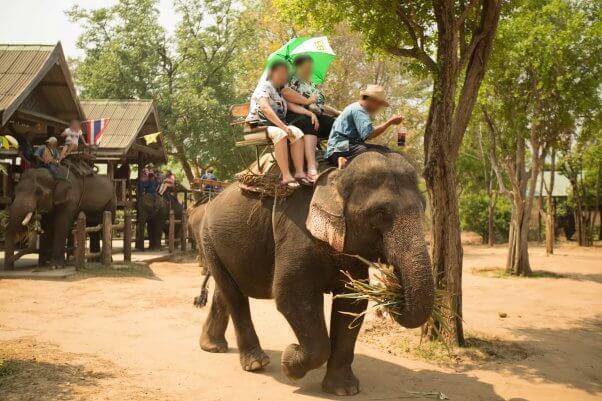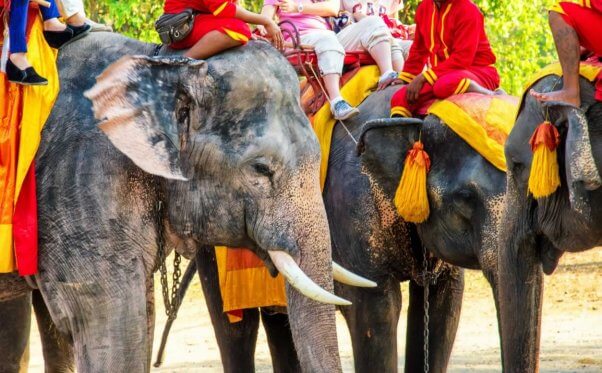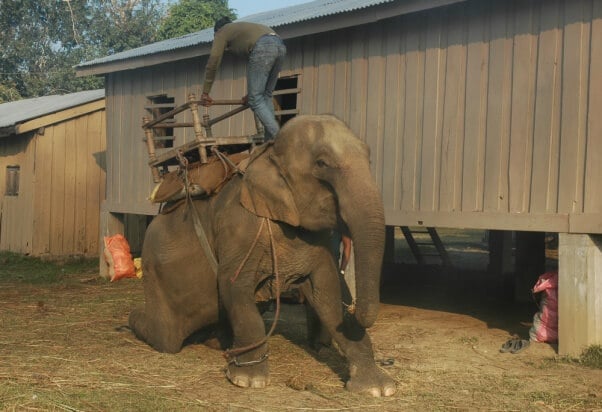Elephant In The Room, Congressional Bill HR 2603, Shriners, Elephant Tourist-Attractions in Asia, Nosey & World Elephant Day
Congressional Bill HR 2603 guts the most basic protections of the Endangered Species Act for any species not native to the U.S. It's shocking because Americans like you have made one thing clear: Elephants, apes, rhinos, and other wildlife should be protected, not come under further threat. Tell Congress we care about Africa's wildlife – help stop H.R. 2603 today.
Shriners Are Still Abusing Elephants & Defeating Elephant

The money that the Kora and Anah Shriner chapters (temples) raise by exploiting elephants and other captives in circuses does not go to the twenty-two Shriner Hospitals for Children. It goes to fund the operations of the chapters including such things as building maintanance. This is true of Shriners across the U.S. who also exploit elephants, making them one of the biggrest sponsors of captivity and abuse of fellow animals. Shriners also hold many non-circus fundraisers that actually go to Shriner Hospitals for Children. They are creative and successful without exploiting elephants. Obviously, they can choose to raise money for their administrative expenses this way as well.
Shriners across the U.S. have tricked the public into believing their circus fundraising is harmless family entertainment. They hide from children how elephants suffer during long trips in close confinement as they are trucked from town to town, month after month. This stresses and harms elephants physically and psychologically in ways unique to traveling circuses. Their elephant sensibilities are assaulted by crowds of shouting people and demeaned when children and adults pay to ride on their backs.
Shriners effectively lie to children about what their circus tickets pays for. This, and elephant abuse, runs counter to the Shriners Creed, described in The Fez Owner’s Manual: “As individuals, we pledge ourselves to integrity, virtue and nobility of character.” We are moving as a society to understand that elephants belong in Africa, and if already captive, they should be moved to accredited sanctuaries where they can live as close to normal lives as possible. Shriners are doing their best to prevent that and should not be supported.
9 ‘Jumbo’ Reasons Not to Ride on an Elephant. More than 3,000 elephants—including babies—are held captive in elephant tourist-attraction “orphanages” and “parks” across Asia, and the number is growing, according to new findings from our friends at World Animal Protection. The animals are beaten into submission when young and then forced to let travelers take rides on their backs and to perform confusing and sometimes painful tricks, including walking on tightropes, balancing on two legs on a small drum, painting pictures, and dancing. But if tourists knew what elephants endured for their vacation photos, they would hit “delete”—on both the pictures and the industry.

2. “Training” begins immediately. The babies are tied down and beaten with bullhooks and other instruments designed to inflict pain until their spirits are broken and they’re willing to obey their “trainers” to avoid pain.
3. Researchers have found that elephants who are subjected to this “breaking” or “crush” process often develop post-traumatic stress disorder.
4. Elephants in nature live in matriarchal herds in which they forage for fresh vegetation, play, bathe in rivers, and travel many miles a day. Held in captivity, they can move only in small circles in an arena or along a short path while carrying humans on their backs, even on the hottest days.

6. Captive elephants are routinely denied nutritious food, adequate water, and needed veterinary care, especially for their feet.
7. The lack of exercise and long hours spent standing on hard surfaces are major contributors to serious foot problems, arthritis, and back injuries. Most captive elephants die decades short of their normal lifespan.
8. According to World Animal Protection, “Between 2010 and 2016 in Thailand alone, 17 fatalities and 21 serious injuries to people by captive elephants were reported in the media. Unreported incidences involving local elephant keepers are likely to make this figure much higher.”
9. Because public awareness of cruelty to captive elephants has increased, many attractions are trying to dupe tourists by adding words such as “sanctuary,” “rescue center,” “refuge,” and “retirement facility” to their names. But the abusive training methods and deprivation are often the same and make the elephants follow the trainers’ commands to let people ride, feed, touch, or bathe them.

In a survey of 13,000 people, one of the primary reasons travelers gave for wanting to patronize elephant rides and shows was “love of animals.” But anyone who shares any concern for the dwindling elephant population or captive elephant abuse should work to end these tourist attractions—not fund them.
Please share this message on your social media platforms and urge your friends and family not to be taken for a ride.
Baby Elephants Are KIDNAPPED so That Tourists Can Ride Them
When vacationing, do NOT ride elephants. This video shows the kind of torture that they endure just so that people can ride them. Baby elephants are torn away from their mothers and beaten until they comply with the cruel training. Take the pledge now not to ride an elephant in any country.






















